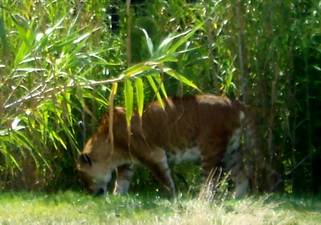|
| Query: lioness | Result: 82nd of 290 | |
Tigon - Wiki

| Resolution: 321x225
File Size: 59192 Bytes
Date: 2005:01:15 11:05:25
Camera: u10D,S300D,u300D (OLYMPUS CORPORATION )
F number: f/3.1
Exposure: 1/250 sec
Focal Length: 1740/100
Upload Date: 2007:09:14 11:18:56
|
Tigon
From Wikipedia, the free encyclopedia
[Photo] Picture of a Tigon from canberra zoo by The bellman (http://commons.wikimedia.org/wiki/User:The_bellman). Date: 15 January 2005
Family: Felidae
Genus: Panthera
Species: P. tigris + leo
Binomial name
Panthera tigon?
The Tigon or Tigron is a hybrid cross between a female Panthera leo (lion), and a male Panthera tigris (tiger). The tigon is not currently as common as the converse hybrid, the liger; however, in the late 19th and early 20th centuries, tigons were more common than ligers.
Tigons can exhibit characteristics of both parents: they can have both spots from the mother (lions carry genes for spots ??? lion cubs are spotted) and stripes from the father. Any mane that a male tigon may have will appear shorter and less noticeable than a lion's mane and is closer in type to the ruff of a male tiger. It is a common misconception that Tigons are smaller than lions or tigers. They do not exceed the size of their parent species because they inherit growth-inhibitory genes from the lioness mother, but they do not exhibit any kind of dwarfism or miniaturisation; they often weigh around 150 kilograms (350 lb).
The comparative rarity of tigons is attributed to male tigers' finding the courtship behaviour of a lioness too subtle and thus may miss behavioural cues that signal her willingness to mate. However, lionesses actively solicit mating, so the current rarity of tigons is most likely due to their being less impressive in size than ligers, with a corresponding lesser novelty value. A century ago, tigons were evidently more common than ligers. Gerald Iles, in At Home In The Zoo (1961) was able to obtain three tigons for Manchester's Belle Vue Zoo, but wrote that he had never seen a liger. A number of tigons are currently being bred in China.
Fertility
In Wild Cats Of The World (1975), Guggisberg wrote that ligers and tigons were long thought to be sterile; in 1943, however, a fifteen-year-old hybrid between a lion and an "Island" tiger was successfully mated with a lion at the Munich Hellabrunn Zoo. The female cub, although of delicate health, was raised to adulthood.
Male tigons are sterile while the females are generally fertile. Because only female ligers and tigons are fertile, ligers and tigons cannot reproduce with each other.
At the Alipore Zoo in India, a female tigon named Rudhrani, born in 1971, was successfully mated to an Asiatic Lion named Debabrata. The rare, second generation hybrid was called a li-tigon. Rudhrani produced seven li-tigons in her lifetime. Some of these reached impressive sizes???a li-tigon named Cubanacan (died 1991) weighed at least 800lb (363 kg), stood 52 inches (1.32 metres) at the shoulder, and was 11.5ft (3.5 m) in total length.
Reports also exist of the similar ti-tigon, resulting from the cross between a female tigon and a male tiger. Ti-tigons resemble golden tigers but with less contrast in their markings. A female tigon born in 1978, named Noelle, shared an enclosure in the Shambala Reserve with a male Siberian Tiger called Anton, in the belief that she was sterile. In 1983, Noelle produced a ti-tigon named Nathaniel. As Nathaniel was three-quarters tiger, he had darker stripes than Noelle and "spoke" tiger rather than the mix of sounds used by his mother. Being only about quarter-lion, Nathaniel did not grow a mane. Nathaniel died at age eight or nine years old due to cancer. Noelle also developed cancer and died soon after.
http://en.wikipedia.org/wiki/Tigon
| The text in this page is based on the copyrighted Wikipedia article shown in above URL. It is used under the GNU Free Documentation License. You may redistribute it, verbatim or modified, providing that you comply with the terms of the GFDL. |
|
^o^
Animal Pictures Archive for smart phones
^o^
|
|

